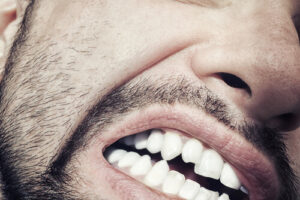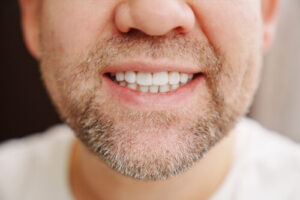Do you find yourself clenching your lower jaw often when stress takes over? Discover effective techniques to alleviate jaw clenching caused by stress and regain control. This article will explore practical strategies to help you break free from this habit, providing the guidance you need to improve your well-being and maintain a healthier, stress-free lifestyle.
Jaw Clenching Symptoms
Jaw clenching, a common issue often related to stress or sleep disorders, can manifest through various symptoms affecting the jaw, upper teeth, front teeth, and other areas. Recognizing these symptoms is key to seeking appropriate treatment and relief.
- Jaw Pain and Tension: A prevalent symptom of jaw clenching is the persistent sensation of pain or tension in the jaw muscles. This discomfort tends to intensify, especially in the morning or after periods of heightened stress.
- Teeth Grinding: Individuals who clench their jaws frequently exhibit teeth grinding, particularly during sleep. This chronic grinding can result in gradual wear and damage to the teeth over time.
- Sore Facial Muscles: The constant tension associated with jaw clenching can lead to soreness and fatigue in the facial muscles, especially around the jawline.
- Headaches and Earaches: Muscle tension stemming from jaw clenching often gives rise to frequent and severe headaches. Additionally, some individuals may experience earaches or a sensation of fullness in the ears. If you’re grappling with these symptoms, seeking professional guidance is advised for proper evaluation and management.
- Temporomandibular Joint (TMJ) Discomfort: Prolonged jaw clenching can strain the TMJ, leading to pain, clicking sounds, or difficulty opening and closing the mouth.
Symptoms of jaw clenching include jaw pain and tension, teeth grinding, a sore jaw, loose teeth and facial muscles, headaches, tooth sensitivity, TMJ discomfort, and potential sleep disruption. These symptoms can significantly impact daily life and oral health.
Identifying Triggers: What Causes Stress-Induced Jaw Clenching
Identifying the triggers underlying cause of stress-induced jaw clenching is vital for prevention and treatment. Understanding these causes can help individuals manage or eliminate the factors contributing to this uncomfortable condition.
- Psychological Stress: High levels of stress, anxiety, or emotional distress are primary triggers for jaw clenching. Stressful life events or daily pressures can exacerbate this response.
- Sleep Disorders: Conditions like sleep apnea or insomnia often correlate with jaw clenching, particularly at night. Disrupted sleep patterns can increase muscle tension, leading to clenching.
- Dental Issues: Misaligned teeth or an uneven bite can contribute to jaw clenching. These dental conditions create physical stress in the jaw muscles and joints, prompting clenching as a compensatory mechanism.
- Poor Posture: In musculoskeletal health, maintaining inadequate posture, particularly during extended periods of sedentary activities such as prolonged sitting or computer work, may incite tension within the neck and facial muscles. This, in turn, can indirectly precipitate instances of jaw clenching.
- Caffeine and Stimulants: it is pertinent to recognize that heightened consumption of stimulants, particularly caffeine, can contribute to an elevation in overall muscle tension, potentially exacerbating the propensity for jaw clenching.
- Medications: Certain pharmaceutical interventions, specifically psychiatric medications such as antidepressants or stimulants, may carry side effects characterized by an increase in muscular tension, including the manifestation of jaw clenching. In such instances, seeking consultation with a healthcare professional is advised to assess and address these implications judiciously.
Psychological stress, sleep disorders, dental issues, poor posture, stimulant use, and certain medications can trigger stress-induced jaw clenching. Identifying and addressing these triggers is crucial in effectively managing and reducing jaw tension and clenching your jaw.
Practical Techniques to Reduce Jaw Clenching During the Day

Reducing jaw clenching during the day involves practical techniques and facial exercises that relieve muscle tension and promote relaxation. These methods can effectively prevent the discomfort and dental issues associated with lower teeth and excessive clenching.
- Mindfulness and Awareness: The first step is to become aware of when and how often you clench your jaw. Mindfulness can help you notice when clenching occurs, particularly during stressful situations, allowing you to relax your jaw consciously.
- Relaxation Techniques: Incorporating relaxation techniques like deep breathing exercises can reduce overall stress and tension, lessening the likelihood of clenching.
- Jaw Exercises: Gentle jaw exercises and stretches can help alleviate tension in the jaw muscles. This might include slowly opening and closing the mouth or moving the jaw from side to side.
- Facial Massage: Massaging the jaw muscles can help release built-up tension. Using your fingers to rub the muscles around the jaw joint and cheeks gently can be soothing.
- Posture Correction: Poor posture, especially while sitting or using electronic devices, can contribute to jaw tension. Correcting your posture to reduce neck and shoulder strain can indirectly relieve jaw clenching.
- Avoid Excessive Chewing: Limiting excessive chewing activities, such as gum chewing or eating chewy foods, can help prevent muscle fatigue and clenching.
- Use of Mouth Guards: For those who clench their jaws during sleep, a dentist-prescribed mouth guard can help prevent teeth grinding and protect the teeth and jaw joint.
- Stress Management: Engaging in activities that reduce stress, such as exercise, hobbies, or counseling, can decrease the frequency of jaw clenching.
- Regular Breaks and Relaxation: Taking breaks throughout the day to relax your facial muscles, including your jaw, can be beneficial. This might involve simple stretching or relaxation exercises.
Practical techniques to reduce jaw clenching during the day involve a combination of mindfulness, relaxation exercises, jaw stretches, jaw massage, facial massages, posture correction, avoiding excessive chewing, using mouth guards if necessary, and overall stress management.
Nighttime Strategies to Prevent Jaw Clenching While Sleeping
Implementing nighttime strategies is crucial for preventing excessive jaw clenching while sleeping, a condition known as sleep bruxism. These strategies aim to reduce muscle tension and tight jaw and create a conducive sleep environment, thus addressing one of the key triggers of jaw clenching.
- Mouth Guards: Using a custom-fitted mouth guard prescribed by a dentist can significantly reduce the impact of clenching and grinding on the teeth and jaw during sleep.
- Stress Reduction Before Bed: Engaging in relaxing activities before bedtime, such as reading, gentle yoga, or meditation, can help alleviate stress, a common cause of jaw clenching.
- Avoiding Stimulants: Limiting the intake of caffeine and other stimulants in the evening can improve sleep quality and reduce the likelihood of clenching.
- Sleep Hygiene Practices: Establishing a consistent sleep schedule and creating a comfortable, quiet, and dark sleep environment can aid in achieving deeper, more restful sleep, thus reducing the chances of clenching.
- Jaw Relaxation Techniques: Practicing jaw relaxation exercises or gentle massage of the jaw muscles before bed can help reduce muscle tension.
- Optimal Pillow and Mattress: Ensuring proper neck support with the right pillow and a comfortable mattress can align the body better, reducing strain on the jaw.
- Physical Therapy: For chronic clenchers, physical therapy exercises to strengthen and relax the jaw muscles can be beneficial.
- Botox Injections: In severe cases, Botox injections administered by a healthcare professional can temporarily relieve muscle tension.
Preventing jaw clenching during sleep involves using mouth guards, engaging in stress-reducing activities before bed, avoiding stimulants, practicing good sleep hygiene, and ensuring proper physical support while sleeping. For those who experience persistent issues stopping jaw clenching, specialized treatments like physical therapy or Botox injections may be considered. These strategies not only aid in reducing the occurrence of jaw clenching but also contribute to overall better sleep quality and oral health.
Exercises and Stretches to Relax the Jaw Muscles
Exercises and stretches for relaxing the jaw muscles are effective techniques for managing tension and discomfort in the jaw area. These exercises strengthen and stretch the jaw and neck muscles together, promoting relaxation and reducing the symptoms of clenching, difficulty chewing, and grinding.
- Jaw Opening Exercise: Gently open your mouth as wide as comfortable, hold it for a few seconds, and slowly close it. Repeat several times to stretch and relax the jaw muscles.
- Side-to-Side Jaw Movement: Keeping your teeth slightly apart, slowly move your jaw from side to side. This exercise helps in loosening the tight muscles around the jaw joint.
- Chin Tucks: Gently pull your chin straight back, creating a “double chin,” to stretch the muscles at the base of your skull. This exercise can also relieve tension in the neck, which often contributes to jaw discomfort.
- Tongue Up Exercise: Place your tongue on the roof of your mouth, open your mouth wide while keeping the tongue in place, and slowly close your mouth. This jaw joint stretch helps to engage the muscles involved in jaw opening.
- Resisted Opening and Closing: Place your thumb under your chin and gently push upward while opening your mouth, providing resistance. Then, place your index and thumb on your chin to gently resist as you close your mouth. This exercise strengthens the jaw muscles.
- Circular Massage: Using your fingertips, massage the muscles around the jaw joint in a circular motion. This helps in relieving muscle tension and increasing blood flow to the area.
- Relaxed Jaw Exercise: Practice allowing your jaw to hang loose with your lips slightly apart, relieving tension in the jaw muscles.
- Breathing Exercises: Deep, slow breathing exercises can also help relax the body, including the jaw muscles.
Possible Complications if Jaw Clenching Left Untreated

Leaving jaw tightness and clenching untreated can lead to several complications that affect oral health and overall well-being. Chronic jaw clenching, often a response to stress or a sleep disorder, can result in both dental and muscular issues if jaw tightness is not addressed.
- Tooth Damage: Constant clenching exerts excessive pressure on the teeth, leading to wear, fractures, or loosening of teeth. This can result in the need for extensive dental restorations.
- Temporomandibular Joint (TMJ) Disorders: Prolonged clenching can strain the TMJ, causing disorders characterized by pain, clicking noises, and limited jaw movement.
- Chronic Jaw Pain: Continuous clenching can lead to persistent and sometimes severe jaw pain, often extending to surrounding muscles.
- Headaches and Earaches: The tension from clenching can cause frequent headaches and ear pain.
- Gum Recession and Bone Loss: Over time, the force of clenching can cause gums to recede and potentially lead to bone loss around the teeth.
- Muscle Fatigue: Jaw clenching can cause the muscles to become overworked and exhausted, leading to discomfort and tightness in the jaw, neck, and shoulders.
- Sleep Disruption: When associated with sleep disorders like bruxism, untreated jaw clenching can lead to poor sleep quality and related health issues.
- Decreased Quality of Life: The pain and discomfort from ongoing jaw clenching can affect eating, speaking, and overall quality of life.
The potential complications of untreated jaw-damaged teeth clenching are extensive, affecting dental health, jaw function, and overall quality of life. These complications can range from tooth damage and TMJ disorders to chronic pain and sleep disruption. Recognizing the signs of jaw and teeth clenching and seeking appropriate treatment is crucial in preventing these adverse outcomes and maintaining good oral and general health.
When to Seek Professional Help: Treatment Options for Persistent Jaw Clenching Symptoms
Seeking professional help is crucial when dealing with persistent jaw clenching, as it can lead to various oral and general health issues if left untreated. Understanding when to seek treatment and the available options can significantly improve outcomes.
- Recognizing Persistent Symptoms: If you experience ongoing jaw pain, headaches, tooth damage, or any discomfort associated with jaw clenching that doesn’t improve with home remedies, it’s time to seek professional help.
- Dental Evaluation: A dentist can assess for signs of teeth grinding (bruxism) and jaw clenching, including wear on the teeth, and can provide custom-fitted mouth guards to protect the teeth during sleep.
- Physical Therapy: For muscle tension and TMJ disorders, a physical therapist can offer exercises and techniques to strengthen and relax the jaw muscles.
- Stress Management Counseling: Since stress is a significant contributor to jaw clenching, counseling or therapy can be beneficial in providing strategies to manage stress effectively.
- Medication: In certain situations, anti-inflammatory drugs could be prescribed to alleviate pain or a muscle relaxant to lower muscle tension.
- Botox Injections: In some extreme situations, a healthcare provider might inject Botox into the facial muscles responsible for jaw contraction, which is temporary.
- Alternative Therapies: Additionally, acupuncture or massage may help release muscle tension and decrease jaw clenching.
- Addressing Underlying Sleep Disorders: If sleep disorders contribute to jaw clenching, a sleep specialist may recommend treatments like CPAP machines for sleep apnea or other appropriate interventions.
Persistent jaw clenching requires professional intervention to prevent long-term damage, reduce jaw and joint pain, and alleviate symptoms. Treatment options range from dental solutions like mouthguards to physical therapy, stress management, medication, and, in some cases, Botox injections or alternative therapies.
In conclusion, managing stress-induced jaw clenching is crucial for maintaining overall well-being. By implementing the right strategies, such as relaxation techniques, exercise, and proper sleep, individuals can effectively alleviate jaw clenching treatment for the tension caused by stress. Incorporating stress management practices into daily routines and seeking professional help when necessary can greatly reduce jaw clenching and promote a healthier lifestyle. Addressing stress-related jaw clenching is key to preventing long-term dental and health complications. So, start taking steps towards relaxation and self-care today to combat this issue for a happier, healthier you.
References
Teeth Grinding (Bruxism): Overview and Treatment
https://www.nhs.uk/conditions/teeth-grinding/
How to Stop Clenching Your Jaw from Stress: Tips and Techniques
https://www.betterhelp.com/advice/stress/how-to-stop-clenching-your-jaw-from-stress/
Bruxism Tips: Managing Teeth Grinding for Better Sleep
https://www.sleepfoundation.org/bruxism/tips
Bruxism (Teeth Grinding): Overview and Management
https://www.hopkinsmedicine.org/health/conditions-and-diseases/bruxism
Taking On Teeth Grinding and Clenching: Causes and Solutions
https://newsinhealth.nih.gov/2021/12/taking-teeth-grinding-clenching
